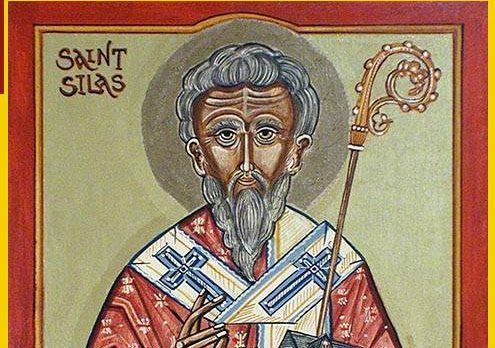When I made my first vows as a Benedictine monk in 2004, I was very excited about the prospect of receiving a new (religious) name. The custom of the community of which I was a member is that the soon-to-be professed monk submits three preferred names to the abbot. The abbot, as head of the community, would then either pick one of the three names or select one of his own choosing.
I spent weeks researching names. The only real considerations were that it had to be the name of a saint or beatus and that there couldn’t be anyone else in the community with that name. In a community of more than 100 members, options were fairly limited. But, I know a lot of saints and wasn’t put off by the prospect of having a name that was a bit out of the ordinary.
And so, I settled on my three choices: Leander, Silas, and Nicholas. Although the community had had Leanders and Nicholases in the past, Silas would be a first. And, after a few days of waiting, Silas was the name I received, leading one grumpy confrere to exclaim, “Silas! That’s unheard of!”
And now, for more than 12 years, this has been my name. When I chose to leave to leave the Benedictines, I had the option of returning to my baptismal name, but Silas had become an inseparable part of who I am. And now, as I prepare to be officially received as a member of the Society of the Divine Savior, I’m happy to bring Silas with me into this new chapter of my life as a religious.
We don’t know much about Silas (whose feast is celebrated on July 13), but the information we do have comes from the New Testament, most especially the Acts of the Apostles.
Silas was a highly regarded member of the Christian community in Jerusalem. In the midst of the debate over the status of Gentile converts to the Faith, the Jewish-Christian leaders, led by Peter and James, chose Silas and Judas-Barsabbas to take a letter to the Christians in Antioch, Syria, and Cilicia and “confirm by word of mouth what we have written in this letter.” One New Testament scholar described Silas as “a Jewish Christian in good standing in the leadership of the Jerusalem church… an approved representative… open to the gentile mission… and effective in a gentile church” (quoted in Butler’s Lives of the Saints [1999 edition]).
After Paul and Barnabas parted ways, Paul chose Silas to accompany him on what we now know as his “Second Missionary Journey” (Acts 15:40). In Philippi, Paul and Silas were charged with causing a disturbance, flogged, and imprisoned. During the night, they were freed from prison by an earthquake. After baptizing their jailer and his family, they fled to Beroea and Paul eventually made his way to Athens; Silas and Timothy later joined him in Corinth (Acts 17:13-15; 8:5). Other than references to Silas (referenced in various epistles under his Roman name, Silvanus), we don’t hear more about Silas in Scripture. Various traditions from the Early Church claim that he died in Macedonia after serving as bishop of Corinth.
Over the years, I have pondered with pride about this man whose name I was given. I’ve also learned a lot over the years about ministry and about the important role that nearly all of us play in the life of the Church: working “behind the scenes,” very few of us, clergy or laity, will ever really hold any far-reaching authority.
This work behind the scenes doesn’t mean that the gifts, resources, perspectives, and insights we have aren’t important. Quite the opposite is true—they are essential. The Church can really only be healthy when each member—like Saint Silas—does his part and gives her best. In my own experience, the greatest damage is done (to individuals and the entire Church) when people are made to feel that they have nothing to contribute or that their gifts don’t matter, which flies in the face of Paul’s counsel:
“There are different kinds of spiritual gifts but the same Spirit; there are different forms of service but the same Lord; there are different workings but the same God who produces all for them in everyone” (1 Corinthians 12:4-6).
There is great potential for good in this teaching—good for parishes and religious communities and for the Universal Church.
May Saint Silas and all the countless behind-the-scenes saints whose names are known only to God guide us as we discern how to best use our individual gifts for the good of our communities, and how we can move forward as a truly catholic Church.

